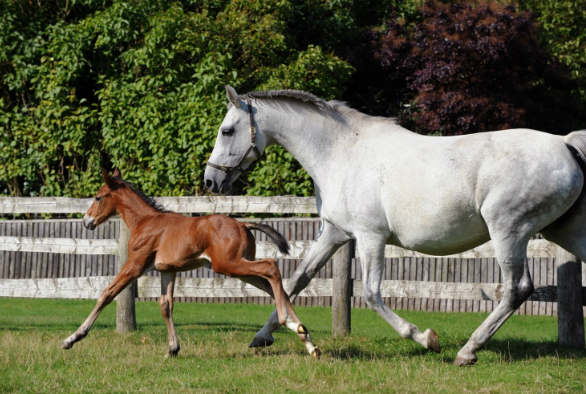
Twemlows Little ICSI with his surrogate mother, Victoria.
The recent birth of two test tube foals in the UK, as part of a collaborative project conducted by leading fertility experts, could help benefit rare breed conservation and horses with fertility problems.
The births mark the successful completion of a three-year programme, led by the University of Liverpool, the University of Surrey and Twemlows Stud Farm. The aim of the project was to establish and offer advanced breeding methods that are not routinely available in the UK.
It is thought that these processes could have further use in breeds under threat of extinction and for valued horses that have died or in cases where mares or stallions have specific fertility problems.
Safety net
One method, called intracytoplasmic sperm injection (ICSI), has the potential to allow greater numbers of offspring to be produced from individual mares and from stallions where sperm samples are limited, allowing breeds to continue in larger numbers. Importantly, this method could allow the embryos of rare breeds to be ‘frozen’, creating a safety net of ‘reserve animals’ should anything threaten the existing stock.
Niamh Lewis, a veterinarian researcher at the University of Liverpool, who managed the project said: “These are complex methods which are currently offered by only a very few centres worldwide. The ability to perform these techniques reliably offers new hope to help overcome various fertility issues in stallions and also provides opportunities to create offspring from valuable mares who have died unexpectedly or cannot conceive in their own right.”
Complex techniques
The foals were born using two different advanced breeding techniques. In June this year a foal named Twemlows Simba became the first foal in the UK to be born using Oocyte Transfer, a technique that involves oocytes (eggs) being collected from a donor mare and then transplanted into a surrogate female before being fertilised.
A second foal called Twemlows Little ICSI was born earlier this month using an ICSI. This technique is already used with great success for infertile human couples and involves a single sperm being injected into an egg through a thin glass pipette to create an embryo which is then transferred to a surrogate female. In this case the egg had been harvested from the ovary of a mare that died 11 months ago and was then matured in the laboratory ahead of the procedure.
Conserving rare breeds
If rare breed embryos can be reliably frozen, as opposed to just semen as currently archived then, in case of a crisis, the breed could be resurrected by returning the embryos to surrogate mares.
Professor Caroline Argo from the University of Surrey, who was the academic lead for the project adds: “At the moment, we can freeze stallion sperm reliably but not horse eggs or embryos. However, ICSI embryos are smaller and more robust to the freezing process. Now that this method has proved successful, it could be possible to use it more routinely and widely for the purposes of conservation.”
The project was a Knowledge Transfer Partnership, jointly funded by the government’s Technology Strategy Board and Twemlows Stud Farm, Shropshire, and encompassed a major collaborative effort, which included working with consultant clinical embryologists in human medicine.
Declining population
Mr Edward Matson of Twemlows Stud Farm said: “We have always strived to stay at the forefront of horse breeding and to offer our clients the most up to date techniques which are firmly centred on good science and focus on the welfare of their animals.
“The opportunity to collaborate with academic and clinical partners has allowed us to extend our service to include these advanced techniques. Until now, clients wishing to embark on these methods were largely dependent on shipping animals to overseas clinics.”
Tom Beeston, CEO of the Rare Breeds Survival Trust, said: “Breeding numbers of all our native equine breeds continue to decline, if not halted soon our gene bank may be needed to reconstitute a breed, it really is that serious. Being able to freeze embryos as well as semen will mean we can do this completely and faster. This project is by far our best hope of being able to do this soon.”
